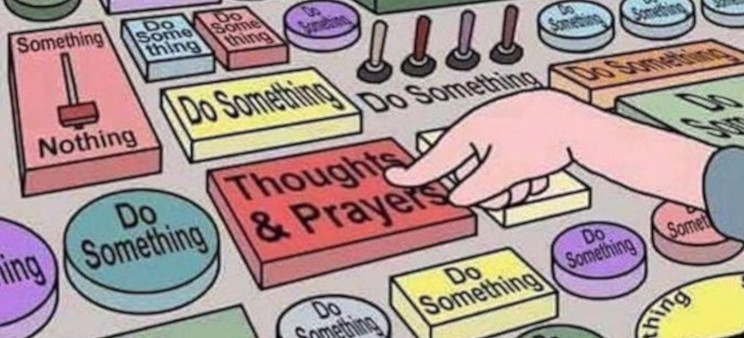We’ve heard it a thousand times; “my thoughts and prayers are with you.”
Trite. Insipid. Mealy-mouthed. Cowardly. Lazy. Insincere. The adjectives stack up as you start to wonder about how that phrase could possibly work to make matters better. At those moments when we feel helpless. Or when we, frankly, don’t want to have anything to do with engaging the tragedy or the evil or the catastrophe. “Thoughts and prayers” is a typical fallback position to take, and it is very effective in removing any sense of accountability or guilt.
To be clear, this is not meant to be a repudiation of prayer and its power. It’s only to say that if one is to pray about something, it must be accompanied by persistence, personal action when appropriate, and conviction about the righteousness of the prayer. For example, don’t pray about feeding the hungry if you never contribute to that prayer concern yourself.
It’s not a new phenomenon – thinking and praying. Isaiah begins his prophecy with a scathing rebuke of offering worship to God without a resulting course of action. No “thoughts and prayers” for the God of Isaiah. Here’s a snippet of what Isaiah wrote:
“What makes you think I want all your sacrifices,” says the Lord…. “Stop bringing me your meaningless gifts… When you lift up your hands in prayer, I will not look…. for your hands are covered with the blood of innocent victims…. Learn to do good. Seek justice. Help the oppressed. Defend the cause of orphans. Fight for the right of widows.” Isaiah 1:11-17.
Similarly, God says through Hosea, “I want you to show love, not offer sacrifices.” And James reminded that “to know what you ought to do and then not do it is sin.” The Bible is awash with God’s impatience with do-nothing pretenders. Folks who never had any intention to roll up their sleeves and do the dirty work of being present, serving others, and trying to make a difference.
Prayer in the Bible is the way of engaging God in the work of God’s kingdom. It is most certainly not meant to be a tranquilizer for our discomfort or laziness. Prayer, in the biblical sense, is a barometer of how seriously we want to see God’s “kingdom come and will be done on earth as it is in heaven.” When we offer up a “thoughts and prayers” sentiment, that’s all it is. Sentiment. Good feelings. Insipid.
What substitutes for “thoughts and prayers” you may ask? It could be any of a multitude of actions and here are a few:
- Cooking food.
- Sending a hand-written, heartfelt card.
- Writing a congressman. Supporting a candidate.
- After school tutoring.
- Contributing money to non-profits that are doing good work. Not just once, but continually.
- Adopting a child either actually or through the good work of organizations that do so.
- Joining a hard-working civic group.
- Sitting with and comforting a person facing loss.
- Voting. Don’t ever complain about anything in this world if you don’t vote. You don’t deserve to complain if you don’t vote.
- Help feed, clothe, and resource poor, disenfranchised people. Find out what their issues and needs are and act on their behalf.
I hope that the next time you are tempted to say “thoughts and prayers” you will, first of all, think about how hurtful that phrase is to suffering people. It’s worse than saying nothing. Second, I hope you will bite your tongue and think about what you can say or do that really, honestly makes a difference. Then your prayers become authentic.

